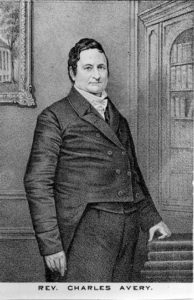
Charles A. Avery
*Charles Avery was born on this date in 1784. He was a white-American merchant, businessman, and abolitionist.
Little is known of his childhood, but Charles A. Avery came to America in 1812. He settled in Pittsburgh and entered the wholesale drug business by founding a firm today, the George A. Kelly Co. His interest expanded later to the cotton industry, and while on buying trips to the South, he was drawn to the plight of the Black slaves.
Joining the abolitionist forces, he aided the escape of slaves from the South to Canada in the Underground Railroad. Avery's motives further caused him to extend his help to the Negro in America by first becoming active in the abolitionist movement. Later, he fought against the Fugitive Slave Laws and gave sums of money to help found Liberia, the West African nation developed by returned American slaves.
Avery also became interested in creating educational facilities for Negroes. Allegheny Institute and Mission Church, later known as Avery College, was built with funds from Avery's fortune. The Greek revival architecture used in many eastern cities heavily influenced this three-story structure.
The school's basement, accessible by hidden trap doors, was probably a "station" (hiding place) on the secret Underground Railway. The first and second floors were used for education, and the third for religious purposes. The congregation that met on the third floor called their church the Allegheny Mission Church.
Charles Avery died on January 17, 1858, and is buried in the Allegheny Cemetery. His fortune was estimated at $800,000 at the time of his death. Among the bequests was $20,000 for Oberlin College, the first college in the United States to admit Blacks. $150,000 was assigned to the "dissemination of the gospel of Christ among the tribes of Africa" and "the education and elevation of the colored people of the United States and Canada.